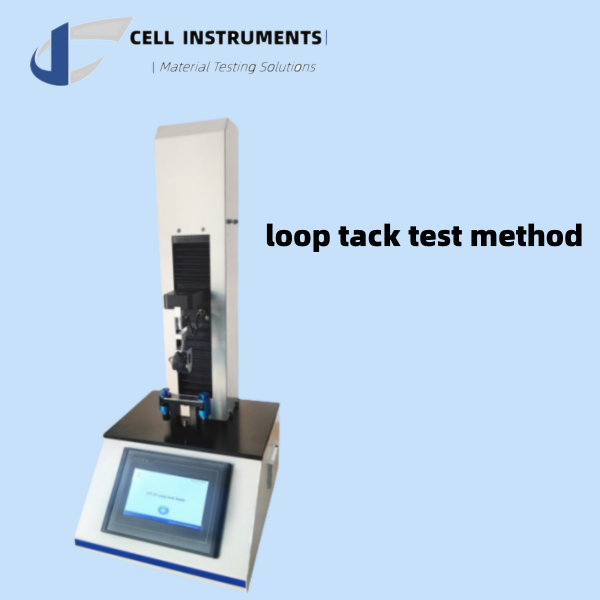Loop Tack Test Method for Pressure-Sensitive Adhesives
In the world of pressure-sensitive adhesives (PSAs), tack is the initial grab that allows a label, tape, or sticker to adhere upon brief contact. The loop tack test method has become a standardized and efficient way to quantify this critical performance property. This article offers a comprehensive guide on how to conduct loop tack testing in accordance with PSTC-16, ASTM D6195, και FINAT FTM 9, and introduces the Cell Instruments LTT-01 Loop Tack Tester—an ideal tool for quality control and R&D environments.
Understanding the Importance of Loop Tack Testing
Ο loop tack test method is widely recognized for evaluating the adhesive’s ability to form an immediate bond with a surface under minimal pressure. Unlike peel or shear tests that measure long-term bond strength, loop tack focuses on initial adhesion, making it particularly valuable for fast-moving applications such as automatic labeling, medical tapes, and temporary bonding.
Key applications include:
- Quality control in PSA tape production
- Product development of labels and self-adhesive films
- Compliance testing for ASTM D6195, PSTC-16, και FINAT FTM 9
Loop Tack Testing and Pressure Sensitive Tape Loop Tack
Test Principle and Standards Overview
Loop tack testing involves forming a loop of PSA material with the adhesive facing outward. The loop contacts a standardized test surface—usually stainless steel ή glass—and the force required to detach the loop is recorded. This force, expressed in Newtons per 10 mm ή pounds per inch, reflects the tack strength of the adhesive.
| Πρότυπο | Loop Length | Surface Area | Key Notes |
|---|---|---|---|
| PSTC-16 | 125 mm or 175 mm | 24 mm × 24 mm | Two test methods (tensile tester or loop tack tester) |
| ASTM D6195 | 125 mm (Method B) or 175 mm (Method A) | 25 mm × 25 mm | Widely used in U.S. testing labs |
| FINAT FTM 9 | 175 mm | 25 mm × 25 mm (glass) | Preferred in Europe for label adhesives |
How to Perform the Loop Tack Test
1. Sample Preparation
- Cut the specimen into 125 mm (for loop tack tester) ή 175 mm (for tensile tester) lengths, 25 mm wide.
- If testing unsupported adhesives, laminate them onto 2 mil PET film.
- Condition the specimens at 23°C ± 2°C και 50% ± 5% RH for at least 24 hours.
2. Surface Cleaning
Clean test panels thoroughly using acetone, MEK, or ethanol-based solvents. Perform at least three cleaning cycles, using lint-free wipes.
3. Test Setup
For Loop Tack Tester (Method B):
- Form the adhesive strip into a teardrop-shaped loop with adhesive facing outward.
- Attach the loop ends using 12 mm masking tape.
- Mount the loop on the upper jaw and bring it into contact with the test panel.
- The tester automatically applies and separates the loop at 300 mm/min.
For Tensile Tester (Method A):
- Use a vertical fixture that holds the stainless steel panel.
- Form a loop using 24 mm × 175 mm strips.
- Engage the crosshead to bring the loop into contact and then separate at 300 mm/min.
4. Measurement and Reporting
Record:
- Maximum force (peak tack)
- Failure mode (adhesive failure, cohesive failure, or adhesive transfer)
- Environmental conditions
- Backing type and coating weight
Use at least three replicates per sample and average the peak values.
Choosing the Right Loop Tack Tester
For laboratories seeking accuracy, repeatability, and compliance, the LTT-01 Loop Tack Tester by Κυτταρικά όργανα offers an optimized solution. This device fully supports ASTM D6195 Method B, PSTC-16, και FINAT FTM 9 protocols. Key features include:
- Precise force measurement with digital output
- Automated cycling for improved repeatability
- Quick-change sample fixtures for different tape types
- Φιλική προς το χρήστη διεπαφή for R&D and quality control
Whether you’re a label manufacturer or a PSA developer, the LTT-01 streamlines your tack testing process and delivers standard-compliant results every time.
Contact Us Get Loop Tack Testing Solution
Ο loop tack test method is essential for quantifying the instant bonding capability of pressure-sensitive adhesives. By following recognized standards like PSTC-16, ASTM D6195, και FINAT FTM 9, and utilizing precision equipment such as the Κυτταρικά όργανα LTT-01, laboratories can ensure reliable, repeatable, και standard-compliant adhesive performance evaluations.
For organizations seeking customization, automation, or expert support, Κυτταρικά όργανα offers full technical solutions tailored to your material testing needs across packaging, medical, pharmaceutical, and beyond.


